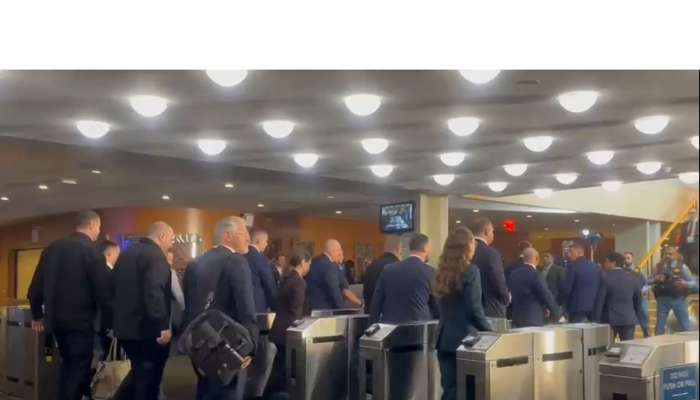
New York: The high-level debate of the 80th session of the United Nations General Assembly (UNGA) commenced on Tuesday in New York, with global leaders convening to address pressing challenges.
Discussions are expected to be dominated by the wars in Gaza and Ukraine, along with the growing Western recognition of Palestinian statehood.
This year's theme is "Better together: 80 years and more for peace, development and human rights."
Brazilian President Luiz Inacio Lula da Silva, Ukrainian President Volodymyr Zelenskyy, and Italian Prime Minister Giorgia Meloni arrived at the United Nations General Assembly to attend the 80th session.
The Presidents of Brazil and the United States, Luiz Inacio Lula da Silva and Donald Trump, respectively, will be the first two nations laying out their priorities for the year ahead. Starting Tuesday, 23 September, more than 150 Heads of State and Government will take turns at the podium of the UN General Assembly to deliver an address during the general debate of the 80th session. The debate will continue on Saturday, 27 September, and conclude on Monday, 29 September.
US President Donald Trump is scheduled to deliver his address on Tuesday, returning to the world stage as a leader who has reshaped America's role in multilateral institutions, drawing both criticism and praise for his approach to international diplomacy.
On the sidelines of the Assembly, several European nations announced their recognition of a Palestinian state. France, Belgium, Monaco, Luxembourg and Malta confirmed recognition on Monday, following similar moves by Britain, Canada, Australia and Portugal a day earlier.
European Commission President Ursula von der Leyen reaffirmed her support for a two-state solution in her address to the UNGA. "We will set up a Palestine Donor Group. Because any future Palestinian State must be viable also from an economic point of view. And we Europeans will set up a dedicated instrument for Gaza's reconstruction. Gaza must be rebuilt," she said.
She added, "When the night is darkest, we must hold fast to our compass, and our compass is the two-state solution. Since the beginning of this war, Europe has been the lifeline of the Palestinian Authority. But we must all do more, and this is why we will set up a Palestine donor group." Von der Leyen further stressed that the only viable peace plan must guarantee "a secure Israel, a viable Palestinian state, and the scourge of Hamas removed."
Palestinian President Mahmoud Abbas, addressing a special session via video link, echoed this call while urging Hamas and its factions to disarm. "The state of Palestine is the only entity eligible to assume full responsibility for governance and security in Gaza. This comes through an interim administrative committee affiliated with the Palestinian government in the West Bank and Arab and international support and participation," he said.
Abbas underlined, "Hamas will have no role in governing," adding, "Hamas and other factions must surrender their weapons to the Palestinian Authority. What we want is one unified state without weapons, a state with one law and one legitimate security force."
He welcomed the New York Declaration adopted in July, calling it "the beginning of an irreversible path" toward an independent Palestinian state with East Jerusalem as its capital, in line with international legitimacy and the Arab Peace Initiative.
Calling for a permanent ceasefire, Abbas said, "The declaration stressed that the war against our people must come to an immediate and durable end. It noted that the crimes emanating from the siege, the starvation and destruction cannot be a means of achieving security. Therefore, we call for a permanent ceasefire."
He further urged humanitarian access through the UN, the release of all hostages and prisoners, Israeli withdrawal from Gaza, and the urgent reconstruction of Gaza and the West Bank through the Cairo International Conference.
At the same time, Abbas condemned "the occupation's crimes," while also denouncing Hamas's October 7, 2023, attacks. He criticised Israeli policies of settlement expansion, annexation, settler violence, and actions at Islamic and Christian holy sites, calling them a "direct threat to Arab national security and international peace."
France and Saudi Arabia co-chaired the special session. French President Emmanuel Macron used the occasion to formally announce France's recognition of the state of Palestine.